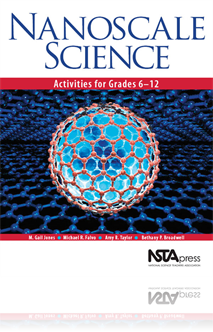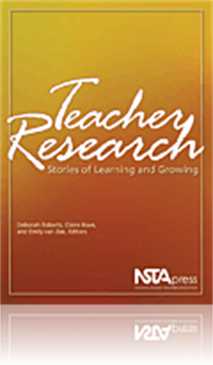All Resources
Book Chapter
Biological Nanomachines: Viruses
Although nanotechnology is a new and emerging field, nanoscale structures are not new. Small molecules such as water, large molecules such as proteins, and larger, more complex objects such as viruses and nanotubes are naturally occurring and exist a...
Book Chapter
What’s In Your Bag? Investigating the Unknown
In nanoscience, like all scientific endeavors, asking the right questions is a vital part of progress. Our ability to observe how things work at the nanoscale is very limited. We need the use of very advanced microscope technologies as well as other ...
Book Chapter
Nanomagnets: Fun with Ferrofluid
Ferrofluid provides an easy opportunity to introduce students to the fascinating properties of the nanoscale. It is essentially a liquid magnet made of nanosized magnetic particles suspended in water or oil. Not only does it demonstrate the strange a...
Book Chapter
Imagine you could build an object that is a billion times smaller than a meter. What would you build? An entire new field has emerged as a result of a new generation of microscopes that allows scientists to investigate the world at the tiniest of sca...
Book Chapter
It’s a Small World After All: Nanofabric
Nanotechnology is producing a variety of new materials we use in our everyday lives. One such development is the latest stain-resistant fabric. This inquiry activity gives students the opportunity to explore and discover unique nanoscale properties o...
Book Chapter
Becoming a Teacher Researcher: Giving Space, Finding Space
Christopher Horne is a teacher specialist for elementary science for Frederick County, Maryland, public schools and an adjunct professor in the education department at Mount Saint Mary’s University in Emmitsburg, Maryland. He is pursuing a doctoral...
Book Chapter
Teachers Supporting Teachers in Learning
Diantha Lay is principal of an elementary school in Montgomery County, Maryland. When she wrote this chapter, she was just starting a new position for the county as a staff development teacher. Earlier she had been a second- and a fourth-grade teache...
Book Chapter
TEAM Connections: Four Teachers’ Journeys Into Action Research
Judy Fix, Norma Fletcher, Dianne Johnson, and Janet Siulc—a group of teachers in the Buffalo Public School District—wondered what they could do that would go beyond talk and speculation about their teaching practices. They wanted to take action i...
Book Chapter
Learning About Motion: Fun for All
Deborah Roberts is a fifth-grade teacher in Phoenix, Arizona. At the time she wrote this chapter, she was a middle-school science teacher in a high-poverty suburban school in Maryland. An earlier version of this paper was presented at the University ...
Book Chapter
Reflections on Fostering Teacher Inquiries Into Science Learning and Teaching
Emily van Zee is an associate professor of science education at Oregon State University and co-organizer of Teacher Researcher Day at National Science Teachers Association (NSTA) national conferences. She has been a middle school science teacher, sco...
Book Chapter
Reading, Writing, Comprehension, and Confidence—Achieved in Science Contexts
When Elizabeth Kline wrote this, she was a fifth-grade teacher in Prince George’s County, Maryland. A desire to integrate scientific concepts in a curriculum dominated by reading, writing, and mathematics motivated her to change the way she taught ...
Book Chapter
Fourth-Grade Scientists Investigate Electric Circuits
Trisha Kagey Boswell is a third-grade teacher at an elementary school in Montgomery County, Maryland, where she has taught for eight years. Her school is an art-integrated magnet school. When she wrote this chapter, she was a first-year teacher, teac...
Book Chapter
Ellen Franz is a teacher at an elementary school in the Sausalito Marin City School District, a small district just north of San Francisco. When she wrote this poem, she was teaching primary grades in a midsized urban school district and had been in ...
Book Chapter
When students Don’t Talk: Searching for Reasons
Mary Bell has taught for 23 years in a large suburban school district near Washington, DC. As an elementary special education and Reading Recovery teacher, she cotaught reading, science, and math as part of an inclusion model. Currently, she is worki...
Book Chapter
Evolving Ethical Perspectives in an Eighth-Grade Science Classroom
Matthew Ronfeldt’s dissertation as a doctoral candidate in Curriculum and Teacher Education at Stanford University is a crossprofessional study of how professional education supports novice teachers and clinical psychologists in adapting to their n...




